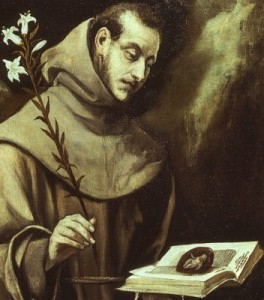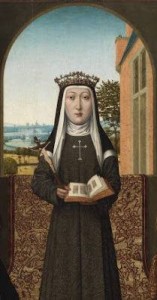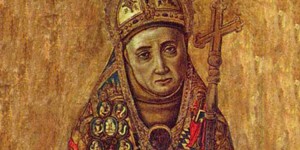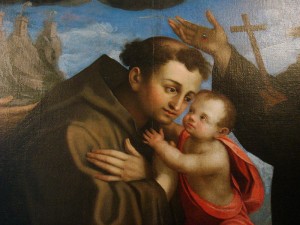The Church liturgically honors Saint Anthony of Padua, a Franciscan priest, renown preacher, miracle-worker and Doctor of the Church (1195-1231). Saint Anthony is clearly a pivotal figure in the hearts of many Catholics. His biography is very intriguing. Here is the Blessing of Lilies for the feast of Saint Anthony of Padua.
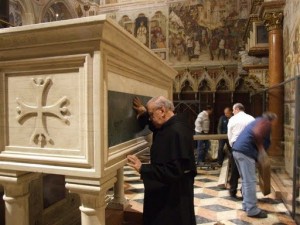 Born in Lisbon, Portugal, in 1195, Fernando de Bouillon was of a noble family related to the famous Godefroy de Bouillon, founder and first sovereign of the Latin Kingdom of Jerusalem, who at the close of the Crusade of 1099 had refused to wear a crown, there where Christ had worn one of thorns.
Born in Lisbon, Portugal, in 1195, Fernando de Bouillon was of a noble family related to the famous Godefroy de Bouillon, founder and first sovereign of the Latin Kingdom of Jerusalem, who at the close of the Crusade of 1099 had refused to wear a crown, there where Christ had worn one of thorns.
Favored by nature and grace, Fernand resolved at the age of fifteen to leave the world and consecrate himself to God in the Order of Canons Regular of Saint Augustine. No flattery, threat or caress of his relatives could persuade him to leave that holy refuge. He asked to be transferred to another convent to avoid the family’s solicitations, and was sent to Coimbra. Still young, his sanctity became evident through miracles; he cured a poor religious whom the devil was obsessing, by covering him with his cloak.
When this young monk decided, after witnessing the return of the martyred remains of five Franciscans who had gone to Africa, to join that Order so favored with the graces of martyrdom, the Augustinians were desolate but could not prevent his departure, for Saint Francis himself appeared to him in a vision in July 1220, and commanded him to leave. He was then sent by the Franciscans to Africa, but two years later was obliged to return to Italy because of sickness; thus he was deprived of the martyr’s crown he would have been happy to receive.
In 1222 Anthony, as he was now called, went with other Brothers and some Dominican friars to be ordained at Forli. There Fra Antonio rose under obedience to preach for the first time to the religious, and took for his theme the text of Saint Paul: Christ chose for our sake to become obedient unto death. As the discourse proceeded, the Hammer of Heretics, the Ark of the Testament, the eldest son of Saint Francis, stood revealed in all his sanctity, learning, and eloquence before his rapt and astonished brethren. He had been serving in the humblest offices of his community; now he was summoned to emerge from this obscurity. And then for nine years France, Italy, and Sicily heard his voice and saw his miracles, whose numbers can scarcely be counted. A crowd to which he was preaching outdoors one day, when the church was too small to hold all who came to hear him, amidst thunder and lightning felt not one drop of water fall upon them, while all around them the rain poured down. And men’s hearts turned to God.
We may wonder why we always see Saint Anthony with the Child Jesus in his arms. The account of this heavenly visitation was told only after his death, at the official process concerning his virtues and miracles. It was narrated by the man who witnessed the marvel in question; the Saint himself had never spoken of it. Saint Anthony was in the region of Limoges in France, and was offered hospitality, rest and silence by this businessman of the region, in his country manor. He was given a room apart, to permit him to pray in peace; but during the night his host looked toward his lighted window and saw in the brilliance a little Infant of marvelous beauty in the arms of the Saint, with His own around the Friar’s neck. The witness trembled at the sight, and in the morning Saint Anthony, to whom it had been revealed that his host had seen the visitation, called him and enjoined him not to tell it as long as he was alive. The town near Limoges where this occurred remains unknown; the original account of the inquiry does not name it, but says that the man in question narrated it, with tears, after Saint Anthony’s death.
After a number of years of teaching of theology, unceasing preaching and writing, Saint Anthony, whose health was never strong, was spending a short time of retreat in a hermitage near Padua. He was overcome one day with a sudden weakness, which prevented him from walking. It progressed so rapidly that it was evident his last days had arrived. He died at the age of thirty-six, after ten years with the Canons Regular and eleven with the Friars Minor, on June 13, 1231. The voices of children were heard crying in the streets of Padua, Our father, Saint Anthony, is dead. The following year, the church bells of Lisbon rang without ringers, while in Rome one of its sons was inscribed among the Saints of God.
Reflection. Let us love to pray and labor unseen, and cherish in the secret of our hearts the graces of God and the growth of our immortal souls. Like Saint Anthony, let us attend to this first of all and leave the rest to God.
Les Petits Bollandistes: Vies des Saints, by Msgr. Paul Guérin (Bloud et Barral: Paris, 1882), Vol. 6; Little Pictorial Lives of the Saints, a compilation based on Butler’s Lives of the Saints, and other sources by John Gilmary Shea (Benziger Brothers: New York, 1894).
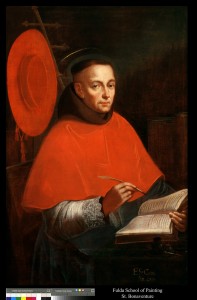 Saint Bonaventure, today’s saint, is not as known among Catholics as his contemporary Aquinas is. Yet, he is a theologian and Doctor of the Church of some consequence. A Franciscan, priest and cardinal of the Roman Church, Bonaventure requires our attention. Below is a paragraph from the Divine Office today.
Saint Bonaventure, today’s saint, is not as known among Catholics as his contemporary Aquinas is. Yet, he is a theologian and Doctor of the Church of some consequence. A Franciscan, priest and cardinal of the Roman Church, Bonaventure requires our attention. Below is a paragraph from the Divine Office today.